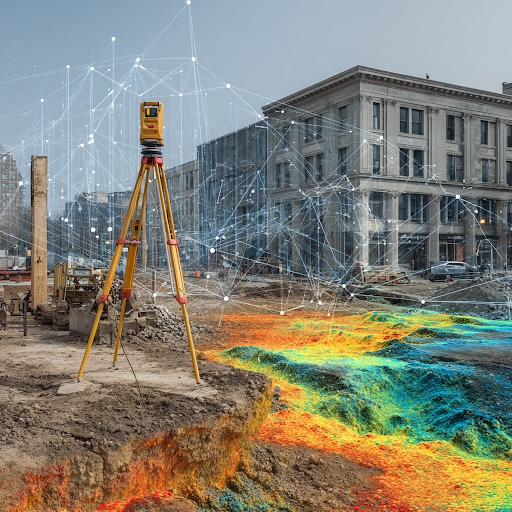The convergence of artificial intelligence and construction technology is rewriting the rulebook for how we approach underground work. Today’s advanced basement waterproofing planning leverages machine learning algorithms that can predict foundation settlement patterns with remarkable accuracy, while comprehensive basement waterproofing assessments now incorporate AI-driven soil analysis that would have seemed like science fiction just five years ago. This technological revolution transforms reactive construction methodologies into proactive strategic planning, saving both money and structural integrity before the first shovel breaks ground.
Think of AI site analysis like having a crystal ball that actually works. Traditional site surveys relied on limited soil samples and human interpretation, essentially making educated guesses about what lurked beneath properties. Modern AI systems process thousands of data points simultaneously, analyzing soil composition, moisture content, historical settlement patterns, and even weather data to generate predictive models. These systems learn from every project, continuously improving their accuracy through machine learning algorithms that identify patterns invisible to human observation. The technology behind visualizing basement waterproofing systems through 3D rendering now extends to predicting structural challenges before construction begins.
The Economics of Predictive Intelligence
According to McKinsey’s research on AI in construction, predictive analytics can reduce project cost overruns by up to 30% through early identification of potential issues. In the basement waterproofing sector, this translates directly to identifying foundation problems before expensive excavation work begins. AI systems analyze geological surveys, municipal records, neighboring property data, and historical construction information to create comprehensive risk profiles for specific sites.
The financial implications extend beyond avoiding mistakes. AI-powered site surveys reduce the time between initial assessment and project commencement from weeks to days. Traditional methods required multiple site visits, laboratory analysis of soil samples, and extensive manual review of historical data. Modern AI platforms aggregate this information instantaneously, processing decades of municipal building records in minutes while cross-referencing current soil conditions with predictive settlement models.
Consider the typical scenario where underpinning services discover unexpected soil conditions mid-project. The contractor must halt work, reassess the situation, redesign solutions, and negotiate additional costs with the client. This disruption often doubles project timelines and increases budgets by 40% or more. AI-enhanced surveys eliminate most of these surprises by identifying problematic conditions during the planning phase, when adjustments cost substantially less than mid-construction modifications.
Machine Learning Meets Geological Reality
The sophistication of contemporary AI site analysis goes far beyond simple data processing. These systems employ convolutional neural networks that can identify patterns in ground-penetrating radar imagery, detecting voids, water channels, and unstable soil layers that traditional analysis might miss. Think of it as giving your site survey superhuman vision that sees through soil and rock to identify structural risks invisible to conventional methods.
Advanced algorithms now incorporate historical settlement data from thousands of projects, learning which soil conditions correlate with future foundation movement. When a new site presents similar characteristics to previous projects that experienced settlement issues, the AI flags these risks immediately, allowing engineers to design preventative solutions before excavation begins. This predictive capability transforms foundation work from reactive problem-solving to proactive engineering.
The integration of IoT sensors with AI platforms creates real-time monitoring capabilities that continue throughout construction and beyond. Moisture sensors, pressure monitors, and movement detectors feed continuous data streams to machine learning systems that identify concerning trends before they become structural problems. If soil moisture levels begin trending upward in patterns that historically precede settlement, the system alerts engineers to implement countermeasures before damage occurs.
Blockchain-Enabled Data Verification
The fintech angle here is fascinating. Blockchain technology is entering construction documentation, creating immutable records of AI site survey results that provide transparency for all stakeholders. When an AI system generates a foundation risk assessment, that analysis gets timestamped and recorded on distributed ledgers, creating verifiable documentation that protects contractors, property owners, and insurers alike.
This blockchain integration addresses one of construction’s persistent challenges: disputed assessments. When foundation issues arise years after construction, determining responsibility becomes contentious. AI-generated surveys recorded on blockchain provide indisputable evidence of pre-construction conditions and predictions, streamlining insurance claims and liability determinations. The technology creates financial efficiencies by reducing litigation costs and accelerating dispute resolution.
Smart contracts built on these blockchain foundations automate payment triggers based on verified project milestones. When AI systems confirm that underpinning work has achieved specified stability metrics, smart contracts automatically release payments without requiring manual verification or paperwork processing. This automation reduces administrative costs while accelerating cash flow for contractors and providing assurance to property owners.
Cryptocurrency and Construction Convergence
Forward-thinking construction firms are exploring cryptocurrency payment options for international projects, where AI site surveys facilitate cross-border transactions. When a Canadian firm conducts AI-powered foundation analysis for a project in another country, cryptocurrency payments eliminate currency conversion fees and international transfer delays. The speed of crypto transactions matches the rapid turnaround of AI assessments, creating efficiency gains throughout the project lifecycle.
Some construction technology platforms now accept cryptocurrency for subscription services that provide AI site analysis tools. This adoption reflects the construction industry’s gradual embrace of fintech innovations that streamline operations and reduce transaction costs. As digital currencies gain mainstream acceptance, expect to see increased integration between AI construction tools and crypto payment systems.
The tokenization of construction projects represents another emerging trend. Property owners can tokenize renovation investments, including AI-assessed foundation work, creating fractional ownership opportunities that democratize real estate investment. AI valuations of foundation improvements provide transparent metrics for these investment tokens, giving investors confidence in the underlying assets.
Predictive Maintenance and Long-Term Value
The true innovation extends beyond initial construction into ongoing property management. AI systems that analyze foundation conditions during construction continue monitoring structural health throughout a building’s lifetime. These platforms aggregate data from embedded sensors, periodic surveys, and environmental conditions to predict maintenance requirements years in advance.
Property owners gain unprecedented visibility into their buildings’ structural health. Instead of discovering foundation settlement after cracks appear in walls, AI systems predict when settlement will occur and recommend preventative measures. This proactive approach transforms building maintenance from reactive crisis management to strategic planning, reducing costs while extending structural lifespan.
Insurance companies are beginning to recognize this value, offering premium reductions for properties with AI monitoring systems. The reduced risk profile justifies lower premiums, creating financial incentives for technology adoption. This trend mirrors developments in auto insurance, where telematics systems that monitor driving behavior reduce accident risk and insurance costs.
Integration with Building Information Modeling
The synergy between AI site analysis and Building Information Modeling creates comprehensive digital twins of construction projects. These digital representations incorporate AI predictions about foundation behavior, allowing architects and engineers to design structures that accommodate anticipated settlement patterns. The result is buildings engineered to remain stable despite soil movement that would compromise conventionally designed foundations.
This integration extends to renovation projects where AI analysis of existing foundations informs optimal approaches for basement waterproofing and structural modifications. The systems can predict how proposed changes will affect load distribution and foundation stability, preventing modifications that might compromise structural integrity. This capability is particularly valuable for heritage buildings where maintaining original structural elements while upgrading functionality requires surgical precision.
The financial modeling capabilities of these integrated systems provide unprecedented accuracy in project budgeting. By predicting foundation challenges before construction begins, AI enables precise cost estimates that account for actual site conditions rather than optimistic assumptions. This accuracy reduces contingency requirements and improves project financing by demonstrating realistic budget projections to lenders and investors.
The Democratization of Advanced Technology
Perhaps most significantly, AI site surveys are democratizing access to sophisticated engineering analysis. Traditionally, comprehensive foundation assessments required expensive consultants and extensive testing protocols that smaller projects couldn’t justify. Cloud-based AI platforms now provide enterprise-level analysis capabilities at consumer-friendly price points, making advanced site surveys accessible for residential renovations and small commercial projects.
This accessibility transforms risk management across the construction sector. Homeowners planning basement waterproofing can access AI assessments that predict settlement risks and recommend optimal solutions, making informed decisions without requiring engineering degrees. Contractors gain competitive advantages by offering clients AI-backed proposals that demonstrate thorough site understanding and reduced project risks.
The technology also creates transparency that benefits entire supply chains. Material suppliers can review AI site assessments to recommend optimal products for specific conditions. Waterproofing membrane manufacturers can suggest appropriate systems based on AI predictions about moisture exposure and soil movement. This collaborative approach improves outcomes while reducing waste from inappropriate material selections.
Future Horizons and Investment Opportunities
The investment landscape surrounding AI construction technology presents compelling opportunities for fintech-savvy investors. Construction technology startups developing AI site analysis tools are attracting significant venture capital, with several achieving unicorn valuations. The sector’s growth projections suggest substantial returns for early investors as construction firms increasingly adopt these technologies.
Public companies incorporating AI into construction operations are demonstrating superior project outcomes and improved margins, creating opportunities for equity investors seeking exposure to construction technology trends. The sector offers diversification benefits as AI adoption accelerates across residential, commercial, and infrastructure projects globally.
Cryptocurrency-focused investors are exploring opportunities in blockchain construction platforms that integrate AI analysis with tokenized project financing. These hybrid platforms represent the convergence of multiple fintech trends, potentially offering exponential growth as construction embraces digital transformation.
The predictive power of AI-enhanced site surveys represents more than technological advancement. It signals a fundamental shift in how construction approaches risk, financing, and project execution. As these systems continue learning and improving, their accuracy will increase while costs decrease, driving widespread adoption across the construction sector. The convergence with fintech innovations creates synergies that amplify benefits, positioning AI site analysis as a cornerstone of modern construction methodology that delivers measurable value to all stakeholders.





























